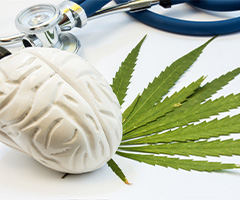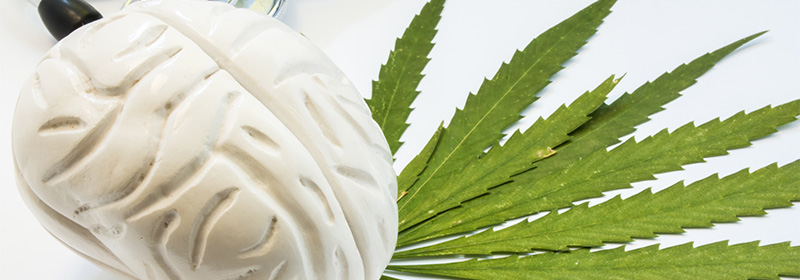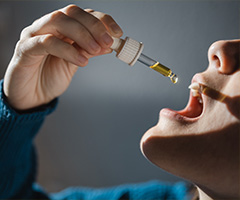Effects of Cannabis

Cannabis, a widely used substance, elicits varied responses from individuals. While some users find it pleasurable and relaxing, others experience anxiety and paranoia. The variability in response is influenced by the strength of the cannabis and its cannabinoid and non-cannabinoid components. Genetics also play a role, with mutations in the FAAH gene affecting enzyme expression and activity, potentially contributing to cannabis use disorder.
Physical Effects of Cannabis Use
Cannabis use impacts the body in multiple ways, including:
- Respiratory Issues: Chronic use can lead to respiratory symptoms like cough, wheezing, and increased risk of lung infections and potentially lung cancer.
- Cardiovascular Effects: Users may experience increased heart rate, risk of myocardial infarction (MI), stroke, and cardiac arrhythmias.
- Neurological and Sensory Effects: Users report altered senses, including brighter colors, altered time perception, and pain relief. High doses can cause hallucinations, delusions, and psychosis.
- Reproductive and Developmental Effects: Reduced sperm production, presence in breast milk, and risks of low birth weight and neonatal intensive care admissions are noted.
- Other Physical Impacts: These include sedation, appetite stimulation, muscle relaxation, reduced anxiety, lowered blood pressure, impaired movement, and hyperemesis syndrome.
Cannabis can also impair cognitive functions, such as attention and memory, and contribute to reduced hippocampal volume and gray matter density, leading to poorer glycemic control in diabetics.
Psychological Effects of Cannabis Use
The psychological effects of cannabis are equally varied:
- Cognitive Impairment: Short-term memory, motor coordination, and judgment can be affected, increasing the risk of accidents and high-risk behaviors.
- Mental Health: Chronic use can lead to decreased life satisfaction, cognitive impairments, poorer educational outcomes, relationship issues, lower IQ, and increased risk of psychosis, especially in those predisposed to mental health disorders.
- Behavioral Effects: While cannabis may reduce aggressiveness in certain patients and improve well-being and quality of life, it can also impair judgment and decision-making abilities.

Perinatal Exposure Risks
Extensive cannabis exposure during pregnancy can result in several risks for the child, such as cognitive impairments, preterm delivery, low birth weight, and stillbirth.
Management of Adverse Effects
Managing cannabis’s adverse effects involves various strategies:
- Mild/Moderate Effects: Support, deep breathing, mindfulness, and distraction techniques.
- Severe Effects: Cease use and seek emergency care if necessary.
- Adjusting Administration: Return to a previously tolerated dose, increase CBD, reduce THC, change the strain, or alter the route of administration.
Effects of CBD
Cannabidiol (CBD), a major component of cannabis, does not produce the psychoactive effects associated with THC. It has garnered attention for its potential health benefits and is legal in many parts of the United States if derived from hemp.
Potential Benefits
CBD may help with:
- Anxiety and Insomnia: Reducing symptoms and improving sleep.
- Pain and Inflammation: Alleviating chronic pain and inflammation.
- Addiction: Lowering cravings for tobacco and heroin.
The FDA has approved one CBD product, Epidiolex, for treating seizures in certain epilepsy syndromes and tuberous sclerosis complex.

Forms and Side Effects
CBD is available in various forms, including oils, extracts, capsules, and topicals. Side effects may include nausea, fatigue, irritability, liver injury, male reproductive toxicity, and mood changes.
Regulatory Concerns
Unapproved CBD products pose several risks, including unverified dosages, potential contamination, and misleading claims, which can delay proper medical treatment. More research is needed to fully understand CBD’s health benefits and safety.
Conclusion
The effects of cannabis and its components, particularly THC and CBD, have diverse and significant effects on the body and mind. While some users may experience therapeutic benefits, others face risks of physical and psychological harm. Understanding these effects is crucial for making informed decisions about cannabis use and managing any adverse outcomes effectively. Ongoing research and regulation are essential to maximize benefits and minimize risks associated with cannabis and CBD.
Continue Your Education
To learn more about the healthcare applications, legal and ethical issues, history, and effects of medical cannabis, check out our Certificate in Medical Cannabis or take the individual course on Cannabis and Its Effects on the Body.
Medical Cannabis Series
Post 5 of 5







